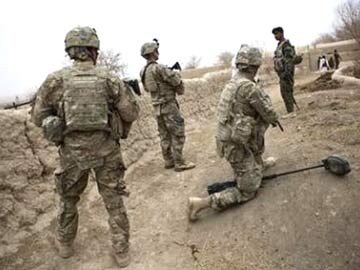
File photo of US troops in Afghanistan. (Reuters)
Kabul:
Afghanistan's opium crop will hit a new high this year, the United Nations said on Wednesday, presenting the new president with a challenge in tackling the trade fuelling the Taliban-led insurgency after the foreign combat mission ends.
Opium cultivation expanded to 224,000 hectares in 2014, according to a survey by the U.N. Office on Drugs and Crimes (UNODC), up 7 percent from the previous year, rising in most poppy producing provinces in Afghanistan.
The survey is likely to further embarrass aid donors who have invested millions of dollars in eradication over more than 13 years of war, only to see crops soar to unprecedented levels, flooding world markets with opium.
The figure showed counter-narcotics efforts in Afghanistan had so far failed, the UNODC's Jean-Luc Lemahieu told reporters ahead of the report's release, but there was hope efforts could be more successful under the new government.
"(Changing) the economic incentives away from the illicit economy to the licit economy, now that's a hell of a task, but that's exactly what indeed this new government seems to stand for," said Lemahieu, the UNODC director for policy analysis and public affairs.
President Ashraf Ghani was inaugurated in late September after months of destabilising tension over who won the election. The stand-off helped speed a sharp economic downturn caused by the withdrawal of foreign troops and uncertainty about Afghanistan's future.
The US-led combat mission ends this year and despite its efforts, the Taliban remain a major force, launching regular attacks on military and civilian targets.
US government officials blame poppy production for fuelling corruption and instability, undermining good government and subverting the legal economy.
Ghani had described a comprehensive plan to tackle the drug problem, Lemahieu said.
"For him the criminalization of the economics and politics of Afghanistan is one of the main problems, it penetrates everything and anything he wants to achieve," he added.
"He is very clear as well that this is part of a regional responsibility and that's exactly what the UN stands for."
Afghanistan produces more than 80 per cent of the world's illicit opium, and profits from the illegal trade help fund the Taliban insurgency. The UNODC said farm gate profits were equivalent to around 4 percent of GDP, at $0.85 billion.
The United States has spent $7.6 billion on counter-narcotics efforts in Afghanistan since launching the programs following the start of the 2001 war, according to the US government watchdog for Afghanistan reconstruction.
Opium cultivation expanded to 224,000 hectares in 2014, according to a survey by the U.N. Office on Drugs and Crimes (UNODC), up 7 percent from the previous year, rising in most poppy producing provinces in Afghanistan.
The survey is likely to further embarrass aid donors who have invested millions of dollars in eradication over more than 13 years of war, only to see crops soar to unprecedented levels, flooding world markets with opium.
The figure showed counter-narcotics efforts in Afghanistan had so far failed, the UNODC's Jean-Luc Lemahieu told reporters ahead of the report's release, but there was hope efforts could be more successful under the new government.
"(Changing) the economic incentives away from the illicit economy to the licit economy, now that's a hell of a task, but that's exactly what indeed this new government seems to stand for," said Lemahieu, the UNODC director for policy analysis and public affairs.
President Ashraf Ghani was inaugurated in late September after months of destabilising tension over who won the election. The stand-off helped speed a sharp economic downturn caused by the withdrawal of foreign troops and uncertainty about Afghanistan's future.
The US-led combat mission ends this year and despite its efforts, the Taliban remain a major force, launching regular attacks on military and civilian targets.
US government officials blame poppy production for fuelling corruption and instability, undermining good government and subverting the legal economy.
Ghani had described a comprehensive plan to tackle the drug problem, Lemahieu said.
"For him the criminalization of the economics and politics of Afghanistan is one of the main problems, it penetrates everything and anything he wants to achieve," he added.
"He is very clear as well that this is part of a regional responsibility and that's exactly what the UN stands for."
Afghanistan produces more than 80 per cent of the world's illicit opium, and profits from the illegal trade help fund the Taliban insurgency. The UNODC said farm gate profits were equivalent to around 4 percent of GDP, at $0.85 billion.
The United States has spent $7.6 billion on counter-narcotics efforts in Afghanistan since launching the programs following the start of the 2001 war, according to the US government watchdog for Afghanistan reconstruction.
© Thomson Reuters 2014
Track Latest News Live on NDTV.com and get news updates from India and around the world

